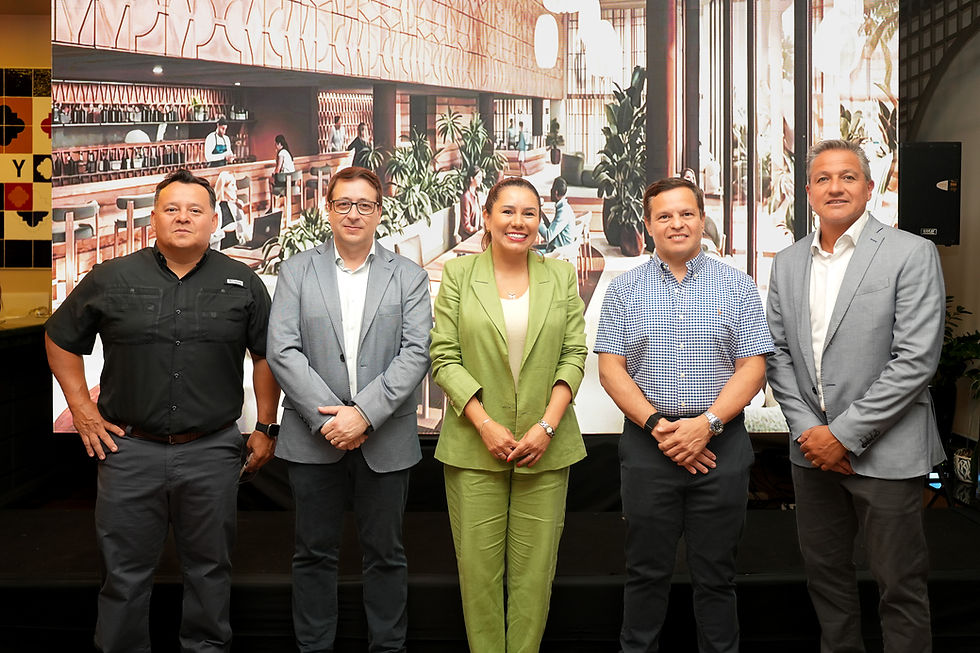Asunción Consolidates Its Corporate Market: JLL First Half of 2025 Report
- Carlos E. Gimenez

- Aug 27, 2025
- 3 min read
Updated: Sep 2, 2025
The Paraguayan capital's corporate office market, still small compared to the region, is showing sustained growth with new space additions, stable prices, and the arrival of high-standard projects that aim to diversify the offering and improve the quality of the available stock.

The Asunción corporate office market continues to consolidate and expand, according to the Corporate Office Market Report for the first half of 2025, published by JLL. The report reveals that the Paraguayan capital remains one of the smallest markets in the region, but also one of the fastest-growing, driven by new projects and increasingly demanding quality and service.
By the end of June 2025, the total corporate office inventory reached 263,000 m², a modest figure compared to similar-sized cities in Latin America, but significant in the local context. Short-term projections indicate growth: between 2025 and 2026, an additional 28,000 m² will be added, representing an 11% increase over the current stock. If projects in advanced planning stages—although with no set opening date—are included, the supply could expand by at least an additional 70,000 m² over the next five years.
One of the market's structural features remains its geographic concentration: 88% of the surface area is located in the Aviadores del Chaco and Villa Morra submarkets. However, a shift in this trend is beginning to become evident. The emergence of new hubs to the west of the city and in adjacent areas heralds a process of spatial diversification that will give companies greater flexibility when choosing their location. Added to this is the progressive improvement in the quality of facilities and the arrival of projects that incorporate international sustainability and safety certifications, elements increasingly valued by multinationals and large corporations.
The development of new office towers also has a broader urban impact. The addition of amenities and services in buildings—common spaces, auditoriums, wellness areas, and energy-efficient technology—not only benefits tenants but also enhances the infrastructure of the neighborhoods where they are located. In this context, it is worth noting that the city will soon add the first project by the studio of British architect Norman Foster, who designed the new headquarters of a leading bank in Paraguay, marking a milestone in local corporate architecture.

Regarding rental prices, the market remained stable. The overall average stood at USD 13.00 per m²/month, practically identical to the previous year (USD 12.90). In the upper segment, corresponding to Class A, the price reached USD 18.20 per m²/month, while Class B stood at USD 12.20 per m²/month. Price stability, combined with the expectation of new supply, creates an attractive environment for companies considering establishing themselves in Asunción, as it allows for negotiating competitive conditions in a still-expanding market.
Factors such as location, age, finishes, sustainability certifications, road and commercial access, HVAC systems, floor efficiency, space typology, parking ratio, and rentable area influence the classification as Class A or B. Currently, almost 90% of Class A buildings are concentrated in Aviadores del Chaco, with a growing expansion toward Villa Morra, particularly around the Mariscal Shopping Center. Meanwhile, Class B buildings predominate in Villa Morra and the Avda. España area, with a growing trend toward Recoleta.
In the Class A segment, the Sudamérica Plaza building is emerging as an icon of the new offering, planned for San Martín and Mariscal López avenues. Its development will mark a turning point in the definition of the Class A product in Paraguay. Meanwhile, Class C buildings, located mainly in the downtown area, have lost relevance for this type of analysis, although they are still considered.
in specific cases, such as for call centers or large retail stores looking for lower rents (USD 7–8 per m²/month).
In addition to its market research work, JLL operates three main business units in Paraguay. The first is transactions, which encompasses the representation of owners and tenants in leasing and sales processes. The second is project management, focusing on the refurbishment and management of construction projects. The third, currently expanding, is the wealth unit, linked to the analysis of hotel and investment projects, which is coordinated with teams in Argentina and Colombia.
With a regional presence throughout Latin America and offices in the United States, Mexico, Colombia, Brazil, Argentina, Chile, Peru, Panama, Uruguay, and Paraguay, JLL is positioned as one of the leading consulting firms in the corporate real estate sector. In Paraguay, its contribution lies in providing transparency and accurate data in a still young but rapidly evolving market.
The report's outlook reaffirms that Asunción's office market, although small, is on a trajectory of sustained growth. Price stability, the entry of high-standard projects, expansion into new areas of the city, and the incorporation of international certifications create an environment with clear opportunities for developers and tenants. In a scenario where scale is still limited, each new project has the potential to change market dynamics, consolidating Asunción as an increasingly competitive destination within the regional corporate landscape.


